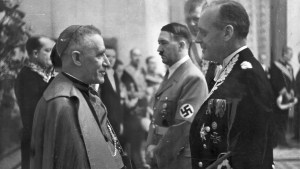“Rome, which only yesterday trembled for the lives of its sons and daughters, for the fate of incomparable treasures of religion and culture, which had before its eyes the terrifying specter of war and unimaginable destruction, looks today with new hope and strengthened confidence towards its salvation.” On Tuesday, June 6, 1944, as Allied troops landed on the beaches of Normandy, Pope Pius XII celebrated a great victory in St. Peter’s Square: the liberation of Rome by General Mark Wayne Clark’s American troops, which took place between June 4 and 5.
But the story could have been quite different. As the sole authority in Rome against the Nazi occupiers since the armistice signed by the Italians on September 8, 1943, Pius XII did his utmost to protect the city, its inhabitants, and its unique cultural and religious heritage. For several years, he set up a veritable humanitarian organization, coordinating the reception of thousands of refugees, many of whom came from southern Lazio after the landing at Anzio in January 1944.
Victory in the hills of Lazio
In March 1944, after the Italian resistance carried out an attack against the occupying forces, Hitler demanded harsh reprisals. This culminated in the Adreatine Caves massacre: 335 civilians, many of them Jews, were murdered.
Tensions escalated further with the rout of Field Marshal Kesselring’s armies in June, during which time the Holy See worked actively — but discreetly — to convince the occupying forces and the Allies not to hand Rome over to war and destruction. Certain districts were bombed, and Pius XII went to meet the victims.

The Allied forces finally won the brutal conflict they were waging against the occupiers in the hills of Lazio, putting an end to six months of hard fighting. They were now at the gates of Rome.
In anticipation, the Germans had mined all the bridges over the Tiber, as well as all the capital’s nerve centers.
There were fears of a bombardment of Rome by the American armies, who had not hesitated to raze entire towns south of the capital in the previous months. Churchill, who had seen London crushed under the bombs, saw no problem in sacrificing the Italian capital.
On June 4, the Germans decided to leave the Eternal City as the first Allied units —Canadians — entered, accompanied by Communist partisans. On hearing the news, Pope Pius XII placed the city under the protection of the Virgin Mary. In the end, the German explosives were not detonated, and the Allied artillery remained silent.
Declared an “open city,” the ancient city was saved. The complete liberation of the city was completed the following day.
“Restrain the instincts of resentment, revenge, and selfishness”
A day later, on June 6, Pope Pius XII decided to greet the large crowd of Romans who had gathered in Rome’s St. Peter’s Square. He pronounced the words quoted above, then thanked God and the Virgin Mary for having inspired both sides “with intentions of peace and not of affliction” to preserve Rome.
As the first purges had begun in the city and many other Italian localities, the Pontiff asked the people to overcome “the impulses to internal and external discord with the spirit of fraternal and magnanimous love.”
The aim was to avoid heavy repression by the German army, which often carried out massacres in places it abandoned. “Restrain the instincts of resentment, revenge, and selfishness,” he implored, asking them to take care of those most in need.
The Nazi forces, who had tried to manipulate Pius XII during those perilous months, would harbor a strong grudge against the Holy See, with Nazi propaganda claiming in August 1944 that “the Church is interested in Jews and Communists, enemies of humanity.”
The Romans, for their part, would never forget Pius XII’s protective action, giving him the title of Defensor Civitatis — the defender of the city.



